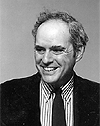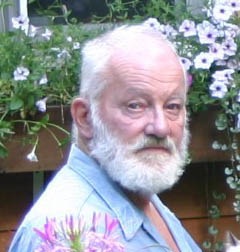


The St. Croix Review speaks for middle America, and brings you essays from patriotic Americans.

Barry MacDonald is the son of Angus MacDonald, the founder of The St. Croix Review. He is the editor and publisher, responsible for day-to-day operations. One of his first tasks on joining the staff of the Review twenty years ago was to read a series of forty books on the Founders. Also, from the beginning, much as did Benjamin Franklin, he learned to operate a printing press.
Barry is the embodiment of the self-reliant, self-motivated individual making his way in a society that is becoming increasingly dependant on government largess. It takes discipline to publish a journal of commentary on social, economic, and cultural concerns that run counter to the fashions of the day.
He does the small and large tasks involved in publishing the Review. His editorials are known for being measured, concise, and insightful..
The following is a summary of the June/July 2014 issue of the St. Croix Review:
In"Our Mission Is to Reawaken the Genuine American Spirit . . ."Barry MacDonald explains the focus of The St. Croix Review.
Thomas Martin, in"Who Am I? What Am I Doing Here?"uses a college commencement speech to impart timeless wisdom.
By Mike Swisher
 Angus MacDonald had already lived more than half of his long and remarkable life by the time I became acquainted with him. He had been born and grown up in Australia, had been ordained a clergyman, had emigrated to the United States on the first ship to carry civilian passengers to this country after World War II,
Angus MacDonald had already lived more than half of his long and remarkable life by the time I became acquainted with him. He had been born and grown up in Australia, had been ordained a clergyman, had emigrated to the United States on the first ship to carry civilian passengers to this country after World War II,

Our mission is to reawaken American pride:
of being a joyous part of the vast adventure of living in a great,
good, and growing nation as free-born individuals.
Our Values
The St. Croix Review acquaints readers with a wide spectrum of conservative thought. We hope to sharpen our readers' perception of passing events, so that they can discern the just cause. The Review is a specific voice in the conservative medley, a voice wide ranging in its outlook, having something cogent to say about economics, the countryside, about high culture, and about the life of ideas. By showing varieties of conservative thought, we make the Review a foremost magazine of conservative opinion.
We promote a broad-based American culture, with a rich history and precious traditions that point to a future full of promise. We emphasize American resilience, independence, creativity, and compassion.
We explain free enterprise, showing how millions of intelligent Americans create prosperity for themselves. We show how honesty, honor, kindness, and generosity are essential virtues infusing each American institution with the spark of life.
Our format is simple and direct; we emphasize clarity of expression. We are not bound to the news cycle, not caught up in media feeding frenzies. We explore basic principles. We cover events as they are: moments in the course of a slow, deep, winding river—the true stream of life.
Founder — Angus MacDonald came to the U.S. in 1946 from Australia with a degree from the College of the Bible (Victoria, Australia). He obtained a Ph.D. in Philosophy from Columbia University in New York City, and served as a Congregational Minister for twenty-five years, finally settling in Minnesota in the 1960s.
It was during the turbulent 1960s (1968 to be exact) that Angus MacDonald thought the nation needed another conservative journal, as the national newspapers, radio, and television were dominated by a left-leaning point of view. Alternative voices were ridiculed, and the country had only a couple of alternative publications so he launched The St. Croix Review.
From the earliest issues the editorial board has included a who's-who list of prominent conservatives: Henry Hazlitt, economist and journalist;Russell Kirk, author of the Conservative Mind; Thomas Molnar, Catholic philosopher and historian; Henry Regnery, Publisher of conservative books; William F. Rickenbacker, prominent writer for theNational Review; and Peter Stanlis, Professor Emeritus of English at Rockford College and author of Edmund Burke and the Natural Law; and Yale Brozan, economist and advocate of free markets.
Angus MacDonald was an early publisher of Milton Friedman, economist at the University of Chicago, and recipient of Nobel Prize in Economic Sciences. The following are some of Milton Friedman quotes:
If you put the federal government in charge of the Sahara Desert, in 5 years there'd be a shortage of sand.
History suggests that capitalism is a necessary condition for political freedom. Clearly it is not a sufficient condition.
Hell hath no fury like a bureaucrat scorned.
Concentrated power is not rendered harmless by the good intentions of those who create it.
The 45-year history of The St. Croix Review resembles that of a self-sufficient farmer on the edge of the American frontier. All the various tasks involved in publishing the journal were done by Angus: to cut expenses he bought a printing press and printed the next issue, even though he had never printed before. He typeset the articles, kept track of subscribers on index cards, typed addresses on each label and sent them out (computers didn't exist in 1968). Each issue of the journal for 25 years was printed, folded, collated, stitched and cut, sorted and addressed by hand in house. And of course Angus wrote editorials the whole time.
It has taken tenacity to survive, and the coming of the computer age has been a blessing, allowing much greater ease and efficiency in publishing. But the perspective of the review has remained the same: common sense, enterprise, and honesty.
Current Authors:
Read about our authors here.
Commendations:
"I am a devoted reader of The St. Croix Review. Its editorials eloquently defend a free society with limited government. Its articles provide a cross section of material in defense of personal freedom. Its wisdom is badly needed as the Leviathan of government keeps growing."
Milton Friedman, Nobel Prize
Winner in Economics
"I have long been a subscriber to a political news magazine called The St. Croix Review. This is essentially a pamphlet published by well-intended notable citizens of our country, with very well-written and oh so pithy articles dealing with politics, trade policy, national defense, and cultural topics, all centered in and around the United States. The format is much like the 5" by 7" pamphlets that contained essays on the notable topics of the day in the 18th and 19th centuries. As to political leaning, these editorial contributions are certainly not containing a leftist or progressive point of view. Nor are they hard right either in the context of the GOP party platform, since it is not preachy, not particularly Christian, and not overtly partisan. I would call it more of an intellectual, libertarian publication, having essays with a tone of pro-defense, pro-civic values, pro-fiscal conservatism, pro-freedom, and pro-stronger and better national character for America. Each bi-monthly version can be read cover to cover in 45 minutes or so and each edition has perhaps 10 to 12 short essays so the reading vignettes can be as short a few minutes at a time.
"I enjoy it a lot and read most of the articles each issue, and I thought of you, since all of you are clearly politically-aware persons.
"In any event, I have arranged for each of you to receive a pre-paid gift subscription to see if you like it and it will by in your mailbox soon."
Robb Johnson, Subscriber
Managing Director
Jones Lang LaSalle
1600 Tysons Boulevard, Suite 1000
McLean, Virginia 22102
"A few months ago I tried a magazine upon the recommendation of a writer in one of my longest running subscriptions. The St. Croix Review may sound like a religious or spiritual magazine but it isn't. It is a small booklet of essays (mostly brief) with a focus on political and moral issues facing the nation. It is a conservative journal but does have input from persons with other views but who write in a non-combative style so that you do give their views serious thought."
Robert L. Morris, Subscriber
Board of Directors
Don Lee met Angus and Barry MacDonald in the late fall of 2001 at a St. Croix Review annual meeting. He was instantly enthralled by the spirit of the publication, and the two gentlemen who ran it. He decided to offer his technology expertise as his way of contributing to the organization. Ten years later he has become a key adviser as The St. Croix Review, adopted computer technology to manage its subscriptions, publication and distribution, including an internet subscription option.
Don Lee is a lifelong Minnesotan, holds a B. S. in Computer Science from the University of Minnesota and is currently a partner in a small software consulting business. He was asked to join The St. Croix Review board in 2003.
Richard Edstrom is a lifelong resident of the St. Croix Valley and a graduate of Gustavus Adolphus College. He has been involved in the financial industry sine 1968 as a bond trader, underwriter, and Senior Management. (Initially with First National Bank of Minneapolis, then Dain Kalman & Quail; Paine Webber Jackson and Curtis; Piper Jaffray Inc.; and RBC Wealth Management.)
Richard Edstrom has served on the following boards: Minnesota Institute of Public Finance (President); Twin City Bond Club (President); St. Croix Valley Hockey Association (President); Stillwater Country Club (President); Our Savior's Lutheran Church (President); Partnership Plan ISD 834 (President); Stillwater Public Library (President); Stillwater Public Library Foundation (President); Fairview Cemetery Board of Trustees; St. Croix Review.
Mike Swisher is President and CEO of Bayport Printing House, Inc. He serves as a director of First State Bank and Trust, Valley Agencies, Inc., and Universal Financial Services, Inc. He is an alumnus of Vanderbilt University, an Officer of the Most Venerable Order of the Hospital of St. John of Jerusalem, and a Fellow of the Society of Antiquaries of Scotland. He is also a member of the Philadelphia Society, and a past president of the Minnesota Society Sons of the American Revolution.
Thomas Martin is the O. K. Bouwsma Chair in Philosophy at the University of Nebraska at Kearney. Along with his fellow colleagues who are dedicated to the study of the Great Books, he teaches the works of Plato, Aristotle, and G. K. Chesterton. This essay is a commencement speech he gave in 2013.
This essay is a review of Stuart D. Goldman's Nomonhan, 1939: The Red Army's Victory That Shaped World War II. Annapolis: Naval Institute, 2012. 228 pp.
This is an account of a Second World War battle between Japan and the Soviet Union that is unknown to most people, even to those interested in that calamity. Has the battle been forgotten or was it deliberately omitted from the historical record? From this reader's study of that monumental disaster, the latter seems to be the case; but for what reason? Who benefitted from the suppression of this story?
L. Philip Vander Elst is a British freelance writer and lecturer whose many publications include Power Against People: A Christian Critique of the State (IEA, 2008) and Vindicated by History: Statism's 19th Century Critics (Cobden Centre, 2012). His article first appeared in the March 2014 issue of the American libertarian magazine, Future of Freedom, and is reproduced here by their kind permission.
 Allan C. Brownfeld is the author of five books, the latest of which is The Revolution Lobby (Council for Inter-American Security). He has been a staff aide to a U.S. vice president, members of Congress, and the U.S. Senate Internal Security Subcommittee. He is associate editor of The Lincoln Review, and a contributing editor to Human Events, The St. Croix Review, and The Washington Report on Middle East Affairs.
Allan C. Brownfeld is the author of five books, the latest of which is The Revolution Lobby (Council for Inter-American Security). He has been a staff aide to a U.S. vice president, members of Congress, and the U.S. Senate Internal Security Subcommittee. He is associate editor of The Lincoln Review, and a contributing editor to Human Events, The St. Croix Review, and The Washington Report on Middle East Affairs.
 Jigs Gardner is an Associate Editor of the St. Croix Review. Jigs Gardner writes on literature from the Adirondacks, where he may be reached via our contact form.
Jigs Gardner is an Associate Editor of the St. Croix Review. Jigs Gardner writes on literature from the Adirondacks, where he may be reached via our contact form.
 Paul Kengor is professor of political science and executive director of the Center for Vision & Values at Grove City College. These articles are republished from The American Spectator. Paul Kengor is author of God and Ronald Reagan: A Spiritual Life (2004), The Crusader: Ronald Reagan and the Fall of Communism (2007), and The Judge: William P. Clark, Ronald Reagan's Top Hand (Ignatius Press, 2007). His latest book is The Communist - Frank Marshall Davis: The Untold Story of Barack Obama's Mentor (Threshold Editions / Mercury Ink (2012).
Paul Kengor is professor of political science and executive director of the Center for Vision & Values at Grove City College. These articles are republished from The American Spectator. Paul Kengor is author of God and Ronald Reagan: A Spiritual Life (2004), The Crusader: Ronald Reagan and the Fall of Communism (2007), and The Judge: William P. Clark, Ronald Reagan's Top Hand (Ignatius Press, 2007). His latest book is The Communist - Frank Marshall Davis: The Untold Story of Barack Obama's Mentor (Threshold Editions / Mercury Ink (2012).